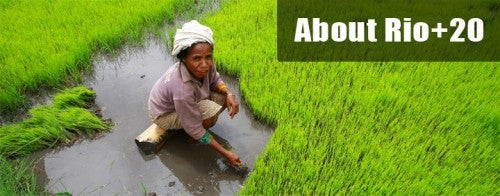The United Nations Conference on Sustainable Development: Rio+20

The United Nations Conference on Sustainable Development, or Rio+20, brought Heads of State and Government to Brazil on 20-22 June 2012. Rio+20 appraised implementation progress and gaps for agreements struck at the landmark 1992 UN Conference on the Environment and Development in Rio, and beyond.
These include Agenda 21, the Programme for the Further Implementation of Agenda 21 and the Johannesburg Plan of Implementation. A high-level political document as well as renewed commitment for sustainable development were expected outcomes of the 2012 conference, which had two primary themes: a green economy in the context if sustainable development and poverty eradication, and an institutional framework for sustainable development.
A series of global, regional and national meetings were held to prepare for the conference and inform negotiations. UN Women had previously underscored the centrality of women's agency, voice, participation and leadership in the achievement of all three pillars of sustainable development— a concept agreed in 1992 that integrates social, economic and environmental issues.
Since the UN system of development agencies as a whole emphasized gender equality and women's empowerment as among pressing priorities that warrant particular attention. UN Women advocated for Rio+20 to:
- Assess progress in implementing international conventions and plans of action on gender equality and women's empowerment in the context of sustainable development, and highlight lessons, gaps, challenges and good practices.
- Call for the effective implementation of previous agreements, including the Nairobi Forward-looking Strategies for the Advancement of Women, Chapter 24 of Agenda 21, Section K of the Beijing Platform for Action, and the conventions on biodiversity and climate change initiated in Rio in 1992.
- Propose measures and actions for governments and other key stakeholders to mainstream gender equality into sustainable development at all levels.
- Strengthen political commitment to sustainable development, and foster strategic partnerships for gender equality, encompassing support from relevant institutions, sufficient financing and the participation of women at all levels of decision-making.